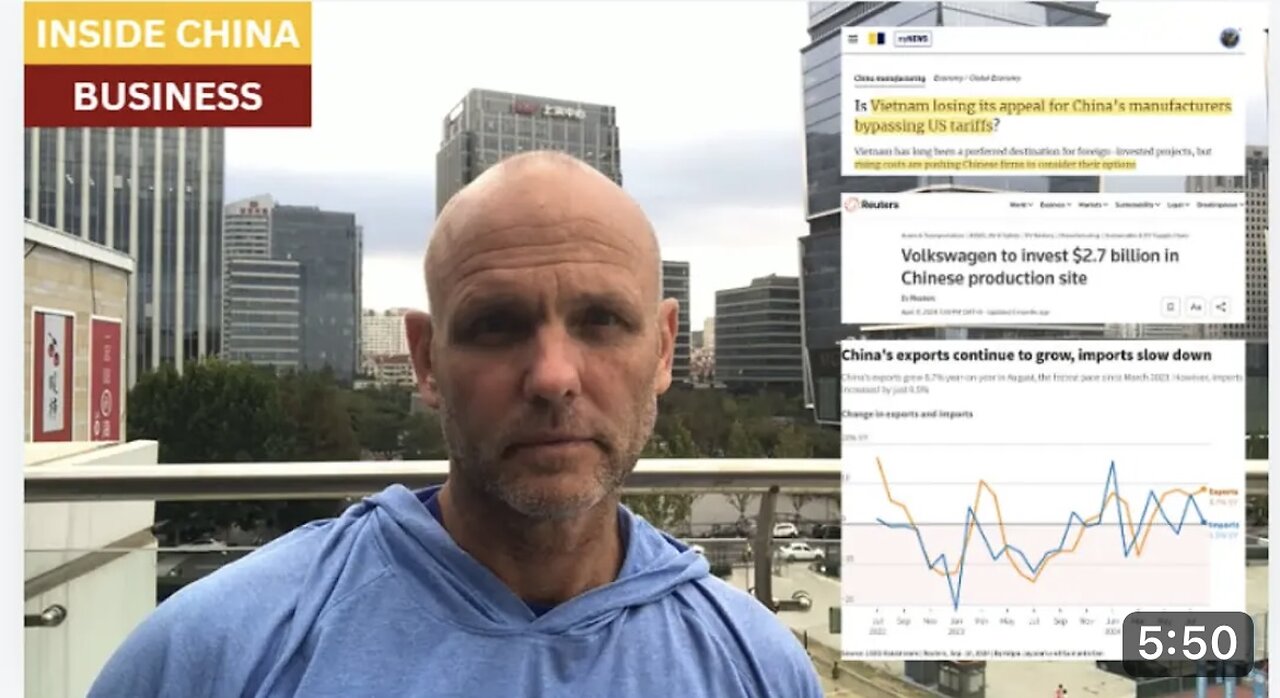Premium Only Content

Chinese companies closing plants in Vietnam & India moving back to China
Video: Chinese companies closing plants in Vietnam & India moving back to China. Germany is closing factories in Germany and moving to China. 中國企業關閉越南和印度工廠,遷回中國。德國正在關閉德國工廠並遷往中國
https://www.reuters.com/world/china/chinas-exports-top-forecasts-imports-disappoint-amid-depressed-domestic-demand-2024-09-10/
https://apnews.com/article/china-trade-august-exports-imports-97f890a585b478287eb71801318e9b4d
https://www.bmwblog.com/2024/04/27/bmw-invest-2-8-billion-in-china/
https://brusselssignal.eu/2024/05/german-chemicals-giant-basf-to-shut-plants-at-home-while-investing-billions-in-china/
https://www.reuters.com/business/autos-transportation/volkswagen-invest-27-billion-chinese-production-site-2024-04-11/
Some Chinese industrial giants have ambitious plans for overseas factory builds, particularly to avoid tariffs in developed world markets.
But recent events argue against that strategy. Chinese exports continue to boom, hitting record highs despite high tariffs and trade restrictions. And the experiences of many Chinese companies in Vietnam showcase the challenges of opening assembly plants in areas where costs are climbing, and where local government policies are unclear, and even changing.
Chinese companies can also look to top German industrial firms, who are making billion-dollar investments in Mainland China, while shuttering plants in Europe, and forgoing investments in developing world markets.
The key problem for manufacturing firms setting up outside China is the lack of access to supply chains and to deep capital and labor pools. Companies are concluding that it is far preferable to set up in China and pass along high tariff rates to buyers, rather than establish new operations in economies where raw materials are harder to come by, operating costs are rising, and the regulatory environments are uncertain.
一些中國工業巨頭制定了雄心勃勃的海外工廠建設計劃,特別是為了避免已開發國家市場的關稅。
但最近發生的事件反對這項策略。 儘管有高關稅和貿易限制,中國出口仍持續繁榮,創下歷史新高。 許多中國企業在越南的經驗表明,在成本不斷攀升、當地政府政策不明確甚至不斷變化的地區開設組裝廠面臨挑戰。
中國企業也可以向德國頂級工業企業尋求協助,這些企業正在中國大陸進行數十億美元的投資,同時關閉在歐洲的工廠,並放棄對發展中國家市場的投資。
在中國境外設立的製造業企業面臨的關鍵問題是缺乏供應鏈以及深厚的資本和勞動力資源。 企業的結論是,最好在中國設立工廠,並將高關稅轉嫁給買家,而不是在原材料難以取得、營運成本上升、監管環境不確定的經濟體中建立新業務
-
 59:46
59:46
Man in America
11 hours agoAI mRNA Vaccines, Turbo Cancer & Blood Clots... What Could Go Wrong?! w/ Tom Haviland
25.8K12 -
 1:09:15
1:09:15
Precision Rifle Network
1 day agoS4E3 Guns & Grub - Trump a new era for gun rights?
42.5K5 -
 1:05:31
1:05:31
Glenn Greenwald
7 hours agoSection 702 Warrantless Surveillance Ruled Unconstitutional: Press Freedom Advocate Seth Stern Explains; The Rise of Unions & the Impact of Trump's Populism with Author Eric Blanc | SYSTEM UPDATE #395
86.4K84 -
 1:01:13
1:01:13
The Amber May Show
5 hours ago $1.60 earnedWomen Of Rumble | Amber, Kelly and Wendy Wild
32.6K2 -
 1:16:38
1:16:38
Josh Pate's College Football Show
7 hours ago $1.26 earnedCFP Title Viewership | JP Poll Under Attack | Bama & Oregon Season Grades | Most To Prove In 2025?
34.2K -
 LIVE
LIVE
VOPUSARADIO
12 hours agoPOLITI-SHOCK! "THE TIDE IS TURNING"! 3 SPECIAL GUESTS JOINING US TONIGHT!
197 watching -
 52:47
52:47
Kimberly Guilfoyle
10 hours agoDismantling DEI Once and For All, Live with Tyler O’Neil & Eric Deters | Ep.190
90.1K32 -
 1:34:59
1:34:59
Redacted News
9 hours agoBREAKING! TRUMP SIGNS ORDER TO RELEASE JFK FILES, CIA IS FURIOUS | REDACTED NEWS
213K385 -
 1:36:09
1:36:09
Benny Johnson
10 hours ago🚨WATCH: President Trump Declassifies JFK, RFK, MLK Files LIVE Right Now in Oval Office, History Now
163K292 -
 2:02:09
2:02:09
Common Threads
8 hours agoLIVE DEBATE: Will Democrats Roll Over or Fight Back?
27.1K1